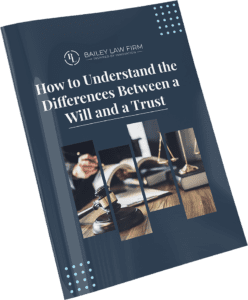
What are the differences between a will and a trust?
A will and a trust are similar in that they both provide for distribution of your estate. For an overview of estate planning laws, see our article here.
Definitions
A last will and testament nominates a personal representative to administer your estate. A will gives instructions on who should receive your assets and belongings after you die.
It can also nominate a guardian for your minor children. Yet, it is subject to probate proceedings after your death.
A trust is a dynamic document and more of a blank canvas. Allowing you to give what you have to who you want, exactly like with a will. A trust can be structured to give what you have when you want while passing down your wisdom and values.
What can I use a trust for?
For example… People use trusts to:
- stagger distributions to their children to prevent waste
- earmark certain funds for their children’s education or business endeavors
- provide for a current spouse for the rest of his/her life while preserving assets to be passed to their own children from prior relationships
- make charitable contributions
- and provide for a disabled beneficiary who is receiving government assistance without disrupting those government benefits.
It can also provide for you if you are incapacitated without the need for court proceedings to appoint a conservator.
A trust avoids probate providing for more efficient estate administration after your death. This does not happen with a will.
This document goes by many names and can serve many different functions. Most common is a revocable living trust sometimes called a family trust or living trust.
This trust provides for administration of your affairs and distribution of your estate. You may amend or change the trust up until your death.
Are there other types of trusts?
There are other types and we outline a few of them here:
- can protect an individual with special needs
- assist an elderly person with qualifying for ALTCS or long-term care benefits
- make charitable donations or provide tax advantages for the wealthy
Trusts may also be set up to care for beloved pets. Trusts may also be set up to legally transfer National Firearms Act (NFA) Title II weapons. As I stated before, a trust is a dynamic document that can address your goals and wishes in the manner you see fit.
How do I get started?
At Bailey Law Firm, we will meet with you so we have a full understanding of your goals and wishes. This is your estate plan so it is important that your goals and wishes are addressed.
Our simple process is as follows:
- understand your goals and wishes
- explain your estate planning options
- provide our recommendations on how to best achieve your goals and wishes
If you elect to go with a trust, we will also work with you to get the trust funded, an important component that is often overlooked.
Download your Ultimate Guide to Estate Planning in Arizona

